December 20, 2022 - No. 62
Quebec Construction Workers Defend Job Site Prevention
Whatever Happens, Health and Safety Representatives Will Be on the Job as of January 1, Workers Say
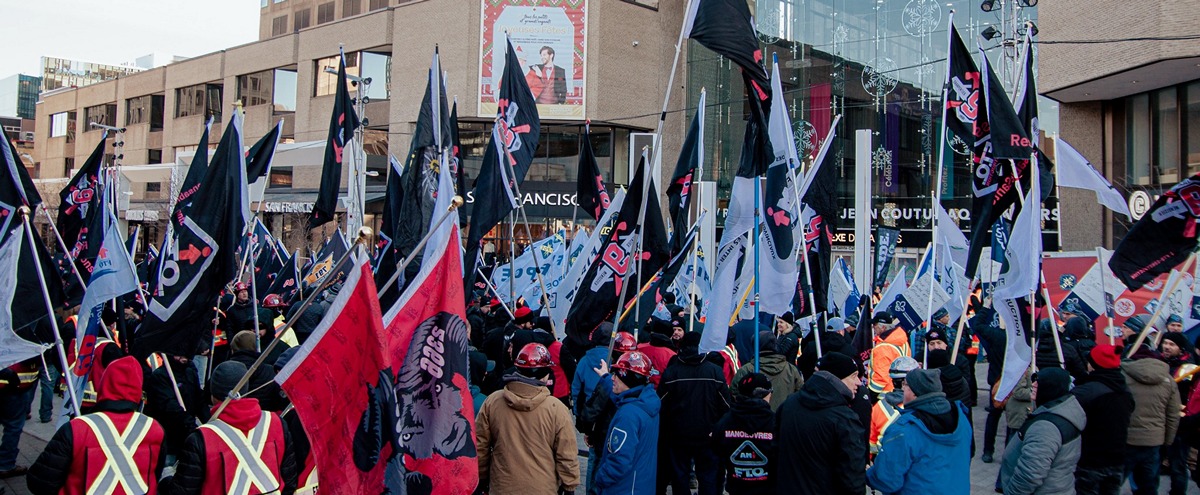
Housing Is a Right
• Montreal Rally
Demands Government Action to
Address Housing Crisis
Crisis at Ontario Tribunals
• How to Provide Ontarians with Access to Justice a Matter of Concern for all Canadians
Quebec Construction Workers Defend Job Site Prevention
Whatever
Happens, Health and Safety Representatives Will Be on the Job as of
January
1, Workers
Say
On December 13, over 200 construction workers took part in a rally outside the offices of the Labour Standards, Pay Equity and Workplace Health and Safety Board (CNESST) to affirm that, no matter what, health and safety representatives, elected and trained by workers, will be on the job at all construction work sites as of January 1.
 The
rally was attended by members of Quebec's five construction unions:
FTQ-Construction, the Quebec Provincial Council of Building Trades
(International), the CSD-Construction, the CSN-Construction and the
Syndicat québécois de la construction. The
occasion was
the coming into force of the
prevention mechanisms provided for in the Act respecting
occupational health and safety,
which, since the Act's adoption in 1979, have never been enacted in the
construction industry. Mechanisms include joint worksite committees,
prevention programs and prevention representatives, now
called Health and Safety Representatives (HSRs).
The
rally was attended by members of Quebec's five construction unions:
FTQ-Construction, the Quebec Provincial Council of Building Trades
(International), the CSD-Construction, the CSN-Construction and the
Syndicat québécois de la construction. The
occasion was
the coming into force of the
prevention mechanisms provided for in the Act respecting
occupational health and safety,
which, since the Act's adoption in 1979, have never been enacted in the
construction industry. Mechanisms include joint worksite committees,
prevention programs and prevention representatives, now
called Health and Safety Representatives (HSRs).
The Act was modified by the Act to modernize the occupational health and safety regime which was passed by the Quebec government in October 2021, which enacts the prevention mechanisms in construction starting January 1, 2023 but leaves them in the hands of employers.
Through their struggle over the years, workers have succeeded in getting some of these mechanisms on larger sites, but worksite accident prevention has been made very difficult due to repression and a climate of silence imposed by construction companies and government, particularly since there is no job security in the industry. Workers consider the introduction of HSRs a way to provide a voice for workers and to effect a dramatic improvement in working conditions, which remain the most dangerous in Quebec in terms of occupational injuries and fatalities.
Following the CSN President's initial remarks, a representative from each construction union spoke. They denounced employer organizations that oppose the implementation of HSRs and negotiate with the government behind the backs of workers. One representative was vigorously applauded when he said that the health and safety of workers is non-negotiable, that it is not like a collective agreement. It's a matter of respect for human life, and cannot be reduced to an issue of a cost to the industry.
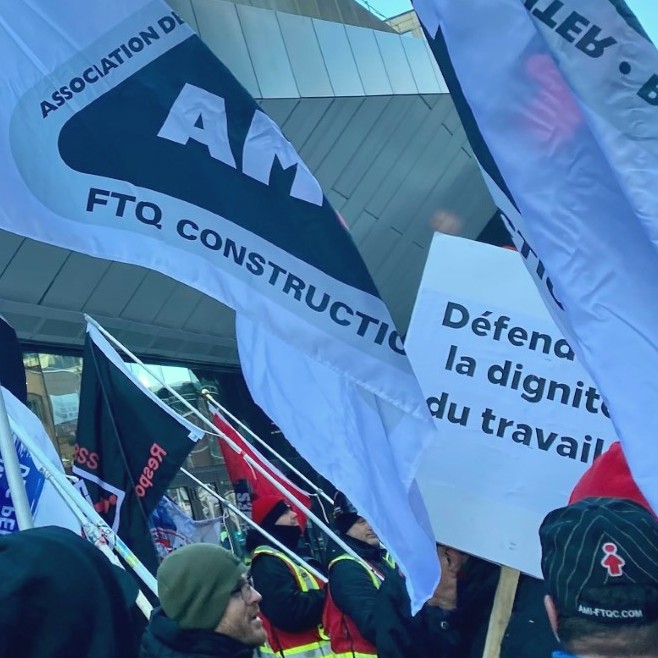 Another
representative, who received loud applause, said that health and safety
and job security go hand in hand, because the lack of job security in
the industry puts workers who dare to speak out at risk. This makes the
work of HSRs even more essential.
Another
representative, who received loud applause, said that health and safety
and job security go hand in hand, because the lack of job security in
the industry puts workers who dare to speak out at risk. This makes the
work of HSRs even more essential.
Yet another said that for the community to take ownership of the health and safety issue, it's important that workers are heard and denounced employer associations who say that the presence of HSRs will hinder the work and even constitute a danger on job sites.
All pointed out that health and safety are not a matter of one's union affiliation and that workers must use the strength of their numbers and solidarity to come together to eliminate job site hazards.
The rally was brief and militant, a declaration that the health and safety situation in the industry must drastically change and that workers are determined to take the necessary steps to make that happen.
Interview
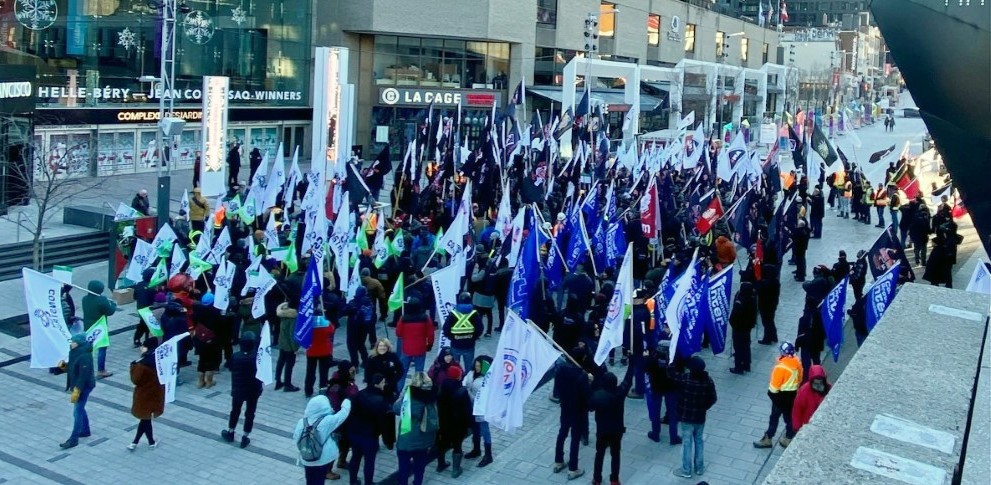
Workers' Forum: In your intervention at the rally you said that it's not the training of Health and Safety Representatives (HSRs) employers are opposed to, but to the HSRs themselves. Can you explain?
Simon Lévesque: The biggest change that will come into effect on construction sites on January 1 is that there will be full- or part-time HSRs on the job on all construction sites. For 40 years the Act respecting occupational health and safety has provided for HSRs as one of its prevention mechanisms, however, that mechanism has not been enacted in the construction industry. Because we fought for HSRs, we succeeded in getting them on larger construction sites.
Health and safety representatives are chosen by the workers. Workers are able to identify hazardous situations on job sites, however there is a big problem in doing anything about them. The problem is that construction workers are not free to report these unsafe situations or even propose corrective action because they have no job security. Rather than addressing unsafe situations, employers tend to get rid of workers.
With the HSRs the situation is different. Employers can't kick out HSRs because they are performing their duties as specified by law. So, the work of the HSRs facilitates workers' ability to speak out.
Employers are trying hard to block the coming into force of the HSRs on January 1. They have asked the government for a one-year postponement. They say they're not ready, that the industry is not ready. But we're ready.
They're speaking to the media, using the pretext of HSR training to try to block the measure. They're using the fact that, by regulation, training developed by the Labour Standards, Pay Equity and Workplace Health and Safety Board (CNESST) for the prevention mechanisms is to start in 2024. However, the mechanisms themselves, including the one on the HSRs, are scheduled to come into effect on January 1, 2023. As for the HSRs who have been working for a dozen years on the larger work sites, those with 500 workers or more, we were the ones who trained them. We are going to continue to do the same thing for the other sites. We'll train them until the CNESST training starts in 2024. We'll comment on the training at that time and continue to prepare them ourselves after they've completed the mandatory CNESST program.
It's important to understand that without the HSRs, employers can control other mechanisms in place, such as worksite committees. For example, it's difficult to even follow up on what has been discussed by the worksite committees, with regard to necessary changes that have to be made, because we have no full-time person doing that work.
The work of the HSRs is central to ensuring that prevention takes place on construction worksites.
(Translated from the original French by TML.)
Housing Is a Right
Montreal Rally Demands Government Action to Address Housing Crisis
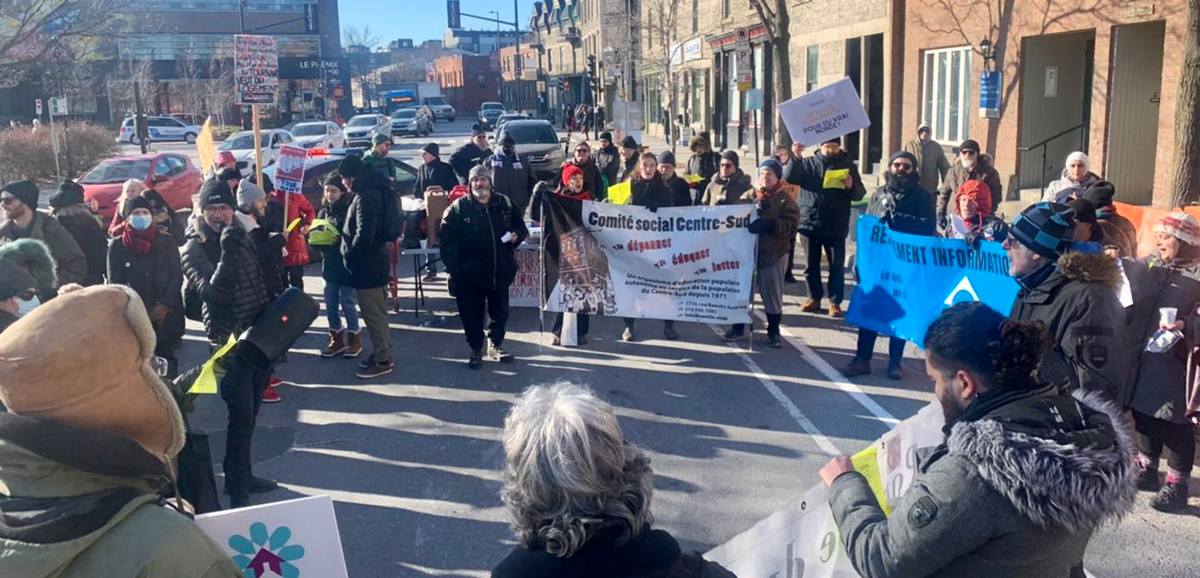
On Monday, December 12, three rallies were held in Montreal to defend the right to housing. About twenty social housing projects are currently called into question and this is a great concern for citizens. Nearly 200 people attended the rallies, traveling from the southwest of Montreal to Rosemont and then to Saint-Léonard with a float designed by the Front d'action populaire en réaménagement urbain (FRAPRU) to denounce this unacceptable situation.
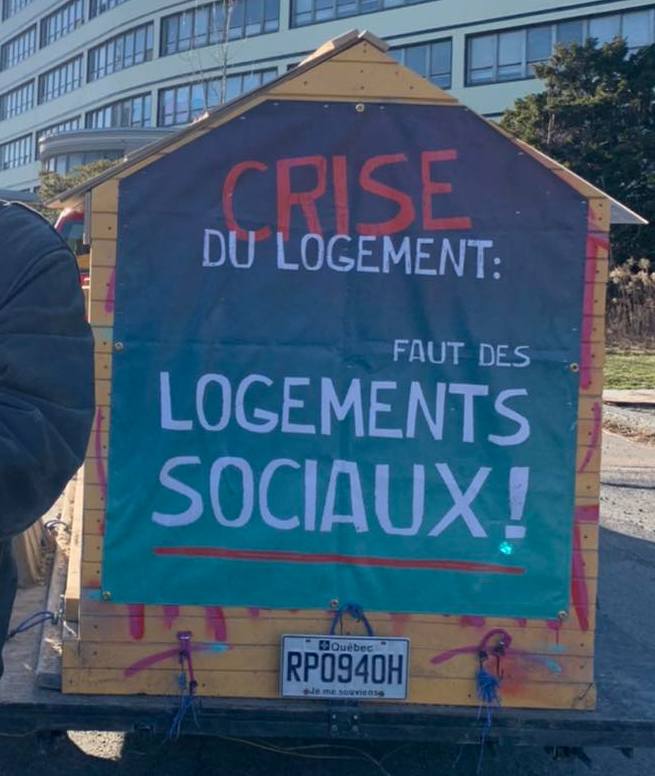 The
housing crisis is deepening and the measures put in place to provide
housing are crumbling. The 17 FRAPRU member groups in Montreal have
denounced the lack of new government investments in programs such as
AccèsLogis to develop new social housing projects. Hundreds
of
social housing units are
currently blocked or threatened because Quebec's funding is not
forthcoming, they say. Neighbourhoods are being transformed and housing
is becoming more and more unaffordable.
The
housing crisis is deepening and the measures put in place to provide
housing are crumbling. The 17 FRAPRU member groups in Montreal have
denounced the lack of new government investments in programs such as
AccèsLogis to develop new social housing projects. Hundreds
of
social housing units are
currently blocked or threatened because Quebec's funding is not
forthcoming, they say. Neighbourhoods are being transformed and housing
is becoming more and more unaffordable.
Steve Baird, coordinator of the Citizens Action Committee of Verdun in FRAPRU's press release: "In Verdun, there are social housing projects that are blocked by the lack of funding from AccèsLogis for new projects. On Gaétan-Laberge Boulevard, there is a project with more than 150 non-profit housing units for families, singles and seniors that is blocked by the negligence of the Quebec government. Since 2015 no social housing for families has been built in Verdun, while the housing crisis keeps getting worse. It does not look good to abandon projects that meet people's needs."
"In Pointe-Saint-Charles, there are two social housing projects that have been dragging on for more than 10 years because of a lack of adequate funding. Tenants at the beginning of these projects have died before seeing them built," testified Hassan El-Asri, coordinator of the Regroupement Information logement (RIL) of Pointe-Saint-Charles, before specifying that in Pointe-Saint-Charles, considering only the local list of applicants for a cooperative or a non-profit housing organization, there are 965 households on hold.
The POPIR-Housing Committee spoke of two projects that are currently delayed or threatened in their area, including the non-profit organization ACHIM in Ville-Émard-Côte-Saint-Paul. "This is a long-awaited 113-unit project for families and singles in an area where no social housing has been developed in 10 years," explains Ines Benessaiah, a community organizer at POPIR. "It was not retained in the Quebec Affordable Housing Program (PHAQ), and there are no units available in AccèsLogis." The PHAQ was set up by the Legault government in the spring of 2022. This program allows the government to provide subsidies to private developers to build "affordable" housing. It is privatization of housing assistance. It has nothing to do with ensuring decent and affordable housing for all.
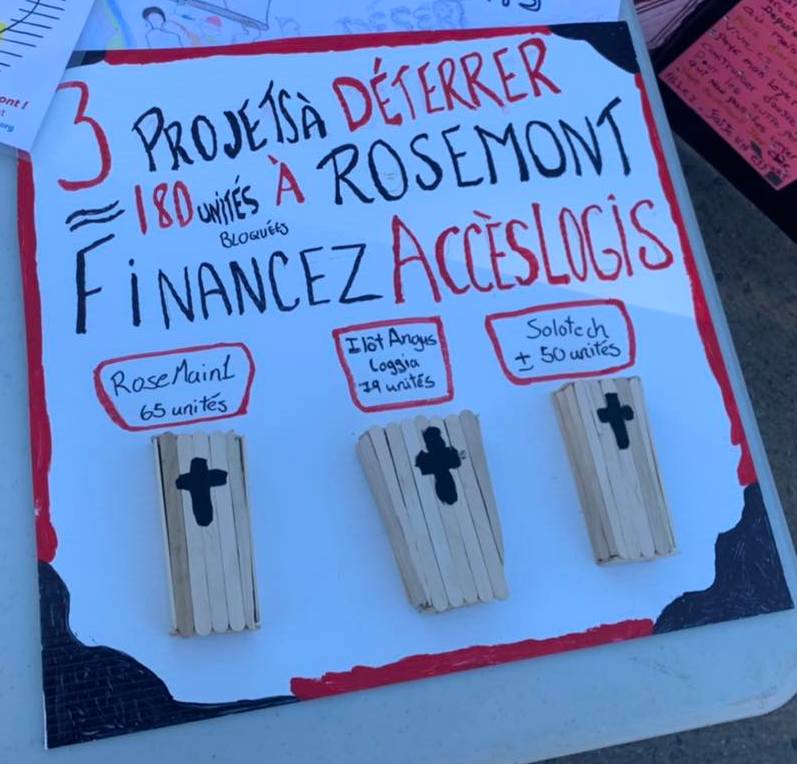 Since the start of the Legault government's first mandate in 2018 barely 5,000 units have
been built, including some 2,500 in Montreal. The annual management
report of the Société d'habitation du
Québec
mentions only 527 units built with AccèsLogis
Québec and
AccèsLogis Montréal, in 2021-2022. As for the
1,700 units financed under the PHAQ, they have already been allocated
and there are only 434 in Montreal, a far cry from the 40 per cent of
units reserved for the metropolis in AccèsLogis. The
2021-2022
annual report of the Administrative Housing Tribunal confirms that the
number of cases of
non-payment of rent is on the rise. The latest HungerCount confirms an
increase in requests for food assistance as well. "Sporadic government
cheques, food banks and the food drive cannot replace the social safety
net; adequate funding for social programs, such as social housing, is
essential," says
Catherine Lussier, community organizer responsible for Montreal at FRAPRU.
Since the start of the Legault government's first mandate in 2018 barely 5,000 units have
been built, including some 2,500 in Montreal. The annual management
report of the Société d'habitation du
Québec
mentions only 527 units built with AccèsLogis
Québec and
AccèsLogis Montréal, in 2021-2022. As for the
1,700 units financed under the PHAQ, they have already been allocated
and there are only 434 in Montreal, a far cry from the 40 per cent of
units reserved for the metropolis in AccèsLogis. The
2021-2022
annual report of the Administrative Housing Tribunal confirms that the
number of cases of
non-payment of rent is on the rise. The latest HungerCount confirms an
increase in requests for food assistance as well. "Sporadic government
cheques, food banks and the food drive cannot replace the social safety
net; adequate funding for social programs, such as social housing, is
essential," says
Catherine Lussier, community organizer responsible for Montreal at FRAPRU.
The members of the housing rights group are now calling on the ministers responsible for Housing and the Metropolis to make this issue a real priority for the next budget. FRAPRU is asking for the financing of 50,000 social housing units in five years, developed by cooperatives, non-profits and housing offices, including 22,500 in Montreal. The group is asking that this be done through new construction needed to fight the shortage, but also through the purchase and renovation of existing buildings and their transfer to non-profit landlords to get affordable rental units out of the speculative market.
Until mid-February 2023, FRAPRU will travel the roads of Quebec to draw attention to the needs in different regions and the social housing projects required to meet them. As the budget approaches, the float will be present in front of the National Assembly in Quebec City as part of a demonstration to be held on February 16.
In February 2022, actions were organized in several cities in Quebec to demand that the Legault government invest in social housing. The demonstrators demanded that the Quebec government stop acting as the instrument of the dictate of private interests to the detriment of the right and urgent need of Quebeckers for housing, especially social housing that meets their needs and is not operated for private profit.
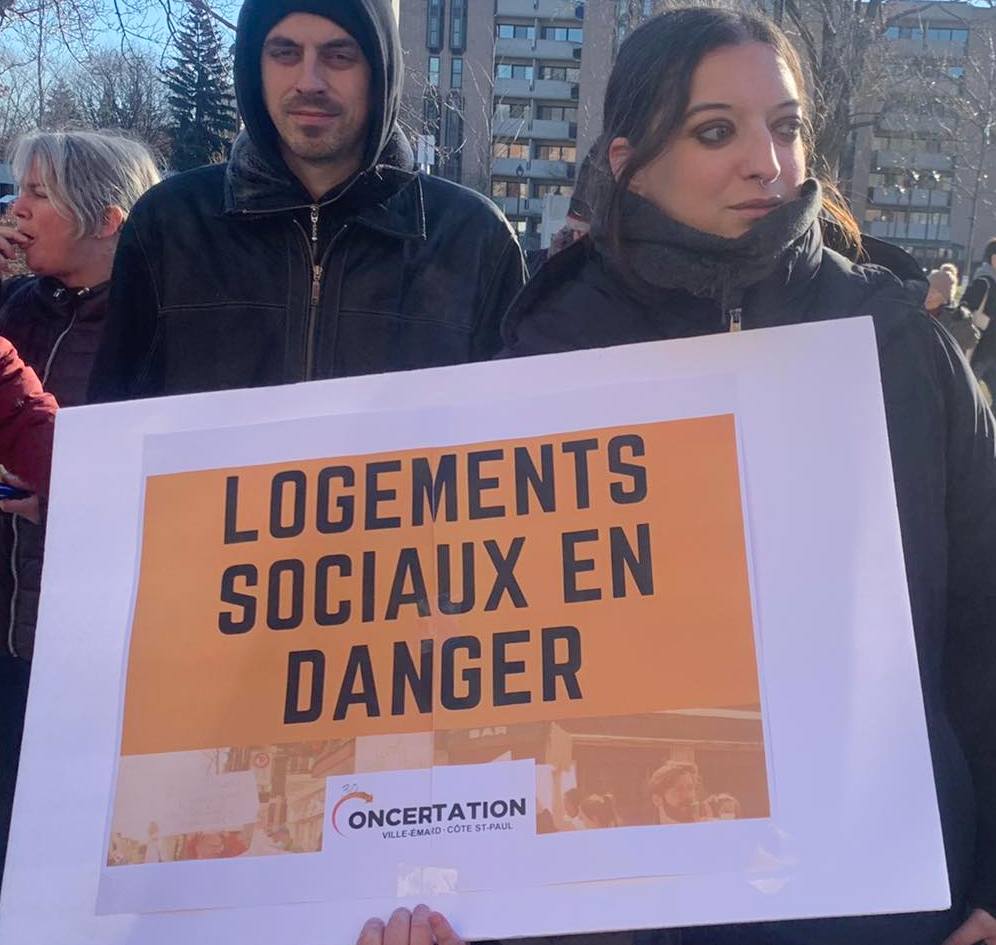
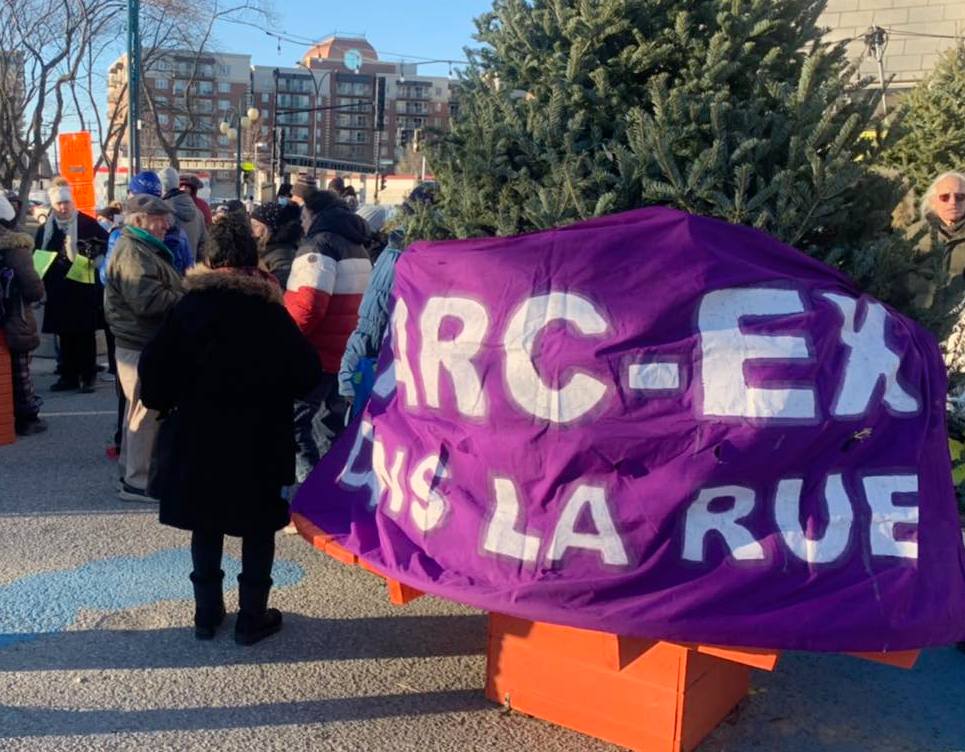
(Quotations translated from the original French by TML.)
Crisis at Ontario Tribunals
How to Provide Ontarians with Access to Justice a Matter of Concern for all Canadians
On December 15, Tribunal Watch Ontario issued a news release and background information raising alarm about the crisis in Ontario's tribunals including the Landlord and Tenant Board and Human Rights Tribunal of Ontario, which are part of the Tribunals Ontario cluster.[1] "People who must rely on these adjudicative tribunals to resolve legal disputes are experiencing unprecedented delays, and discovering that justice delayed is indeed justice denied," they point out.
They note that the latest Annual Report for Tribunals Ontario documents a backlog of 67,736 cases at its four largest tribunals. Of particular concern are the Landlord and Tenant Board (LTB), where the delay in getting to a hearing has ballooned from seven weeks to seven months in the last four years with a backlog of 32,800 cases, and the Human Rights Tribunal of Ontario (HRTO), where the number of final decisions after a hearing has fallen from an average of 110 a year to just 16 decisions in 2021/22 and a backlog exists of 8,979 cases.
Administrative law expert Professor Emeritus David Mullan pointed out: "Over the last four years, the expertise and independence of several key Ontario tribunals have been damaged, leading to threats to the quality and timeliness of justice."
Human rights lawyer and former Chief Commissioner at the Ontario Human Rights Commission Raj Anand, referring to Ontario's human rights process, said: "There are now massive delays at every stage of the process, with parties waiting years for their cases to move forward, and for final decisions."
Tribunal Watch points out: "[O]ur adjudicative tribunals deal with important disputes that would otherwise go to the courts. Ontario needs adjudicative tribunals that are independent, expert and able to provide fair and timely dispute resolution."
Tribunal Watch Ontario is calling on the Ontario Government and Tribunals Ontario to take immediate action to provide access to justice for the tens of thousands of individuals whose lives are affected by these important tribunals.
They have provided a Statement of Concern outlining in great detail what is happening and their proposals to address the situation that can be found here.
Note
1. The Tribunals Ontario website explains "Tribunals Ontario is a group of 13 adjudicative tribunals that play an important role in the administration of justice in Ontario. Each year our tribunals receive and resolve nearly 100,000 cases. [...]
"Our tribunals are: Assessment Review Board, Animal Care Review Board, Child and Family Services Review Board, Custody Review Board, Fire Safety Commission, Human Rights Tribunal of Ontario, Landlord and Tenant Board, Licence Appeal Tribunal, Ontario Civilian Police Commission, Ontario Parole Board, Ontario Special Education Tribunal (English), Ontario Special Education Tribunal (French) and Social Benefits Tribunal."
(To access articles individually click on the black headline.)
Website: www.cpcml.ca Email: editor@cpcml.ca

